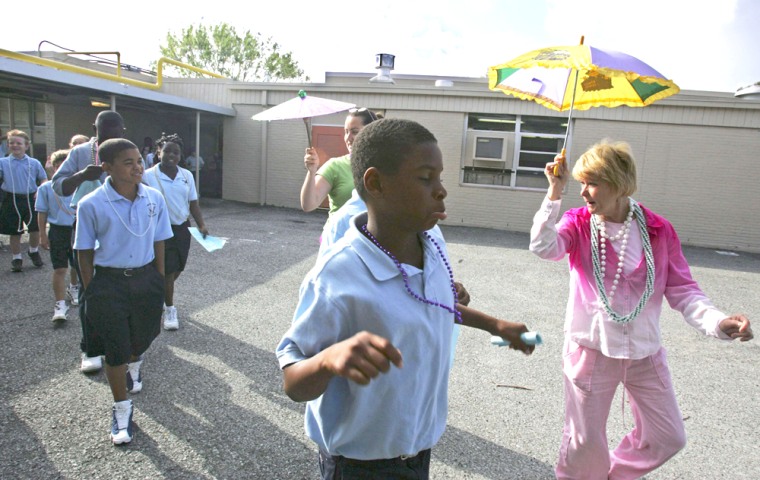The pungent smell of mold seeps out of broken windows at Louis Armstrong Elementary School, where toppled desks lie under overturned bookcases, all caked with layers of potentially toxic mud.
The school is a historic site that, along with another nearby school, was the first in New Orleans to integrate more than 40 years ago. Now a symbol for what faces area schools, it could be bulldozed if found too water-damaged and dangerous.
Even before Hurricane Katrina, the school was one of dozens facing academic crisis in Orleans Parish. It sits in the largely poor lower Ninth Ward, one of the neighborhoods hardest hit by flooding after Katrina.
With the storm forcing all of the area’s 55,000 students away, education officials are seizing the opportunity to rebuild what can be saved and to overhaul an education system that has long ranked near the lowest in the nation.
“It’s hard to find a silver lining from Katrina, but one silver lining is that the school board can start anew,” said Leslie Jacobs, from the state Board of Elementary and Secondary Education. “And if any school district needs to start anew, it’s Orleans.”
District plagued by huge financial deficit
Not only were the majority of schools failing, the district was in financial straits — more than $25 million in the red — prompting it to hire a financial management firm to help the troubled system.
But before Alvarez & Marsal could come to grips with the operational side of the district’s 126 schools, Katrina hit and forced the firm to take on a new role: crisis management.
Company officials, now working with the Federal Emergency Management Agency, are doing school-by-school structural assessments. They’re also working with the school board and national education groups about how to recraft the system.
But before a top-notch educational system can be realized, children who will fill these new, improved classrooms and hallways must return, something no one can promise.
“I would be surprised if they get 10,000 students this year,” Jacobs said. “I’ll be surprised if they end up with 25,000 next year. A tremendous amount of people are out of town where they’re likely to find better housing, better schools and better jobs.”
As of mid-October, families of about 2,000 students had contacted the school board saying they would return in November.
Meanwhile, officials have just begun to venture into the ravaged and overwhelmingly poor Ninth Ward, where water rose to rooftops after levees were breached.
The area is mostly abandoned, its schools still architecturally stunning but devastated. Scattered along the hallway on the second floor of Louis Armstrong Elementary are reminders of the poverty: dozens of pink applications for free lunch. The school’s student body was 99 percent black and 95 percent received free or reduced-price lunches.
If environmental teams determine the school unsafe, it likely will be demolished.
“Would you put your kid in this school again?” asked Martin McFarland, managing director of Alvarez & Marsal, and an expert in real estate and construction.
Starting completely anew?
Some said that if the majority of students don’t return, it might be easier to create a new school system with the help of groups like the Gates Foundation, Council of Great City Schools and Pearson Learning Group.
“We’ll be a smaller system in a smaller city, which might not be a bad thing for us,” said Margaret Nicolosi, a teacher at Jean Gordon Elementary School.
Innovation may be the key for rebuilding.
Recently, the Orleans Parish School Board voted to charter 13 schools on the city’s west bank; Mayor Ray Nagin has said he would ask Gov. Kathleen Blanco to help him create a citywide charter school system.
While many envision a complete turnaround, others offer a word a caution.
“Few people really understand how much work it’s going to take,” said acting schools Superintendent Ora Watson. “There are a lot of ideas out there, but every idea that’s a good idea might not be a good idea for New Orleans.”
Meanwhile, families waiting to return their children to hometown schools are hopeful.
“We’re willing to listen before we just abandon the system altogether,” said Troy Bush, a 41-year-old New Orleans police officer, who hopes to have his children back at Alice Harte Elementary.
“I’ve had job offers in other states,” he said. “For us to relocate would be no problem. But this is our home and we chose to stay. If good people leave, nothing’s accomplished.”
